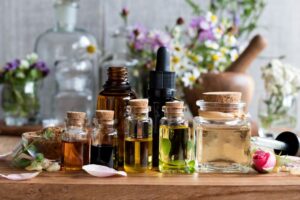
Essential oils have become increasingly popular among individuals who are passionate about natural and holistic health practices. Research suggests that these oils offer a variety of benefits, including promoting relaxation and supporting restful sleep. However, if you are dealing with sleep apnea, you may wonder whether essential oils can be helpful in managing your condition. Although essential oils should never replace professional sleep apnea therapy, they can play a supportive role in your overall wellness routine. This blog post discusses a few oils that you might try and provides tips for using them safely.
Essential Oils That Might Benefit Your Sleep
If you are interested in exploring essential oils as part of your sleep hygiene, you may want to consider the following options:
Eucalyptus
When nasal allergies or colds cause upper airway congestion, the symptoms of obstructive sleep apnea (OSA) can become more pronounced. Eucalyptus essential oil provides a potential solution by making it easier for you to breathe. You can add a few drops to a diffuser to enjoy its soothing aroma, or use a chest rub that contains eucalyptus for more direct relief.
Peppermint
Peppermint essential oil is known for its anti-inflammatory properties, which might assist in reducing airway congestion. It can also help clear mucus from your sinuses, making it easier for you to breathe while you sleep. Many individuals have reported that using peppermint oil leads to less snoring and an improvement in overall sleep quality.
Lavender
Lavender essential oil offers mild sedative effects that may help you relax and unwind at the end of the day. Its calming properties can enable you to fall asleep more quickly and reach deeper stages of sleep, which is particularly important for those managing obstructive sleep apnea.
Chamomile
Chamomile essential oil, similar to lavender, can help you achieve a calm and relaxed state of mind. This oil interacts with benzodiazepine receptors in your body, fostering tranquility and supporting restful sleep. You might choose to use chamomile essential oil or drink chamomile tea before bedtime to maximize its sleep-enhancing effects.
Bergamot
Bergamot essential oil features a distinctive citrusy yet floral aroma and is recognized for its mood-boosting properties. If you are looking for an uplifting addition to your nighttime routine, bergamot may elevate your spirits and encourage better sleep.
Tips for Safe and Effective Use of Essential Oils
Here are some important tips to keep in mind if you choose to use essential oils:
- Continue following your prescribed sleep apnea therapy. Essential oils are intended to supplement, not replace, professional medical treatment.
- Experiment with different combinations of oils and methods of application, such as diffusing them in the air or applying them topically.
- Choose reputable brands that offer pure and high-quality products, since the essential oil industry is not tightly regulated.
- Be aware that essential oils can trigger allergic reactions in some individuals. Perform a patch test before applying oils widely to check for compatibility with your skin and respiratory system.
Essential oils are not a cure for sleep apnea, but they can help you achieve better rest! They might be worth a try if you are looking to elevate your nighttime routine.
Meet the Practice
At Northwest Family Dental Marysville, Dr. Barry Miller is pleased to provide a broad range of services for our community. He has already helped many patients deal with their sleep apnea via oral appliance therapy, a popular and more convenient alternative to a CPAP machine. To learn more about Dr. Miller or our practice’s approach to sleep apnea treatment, contact our office at 937-642-3434.
